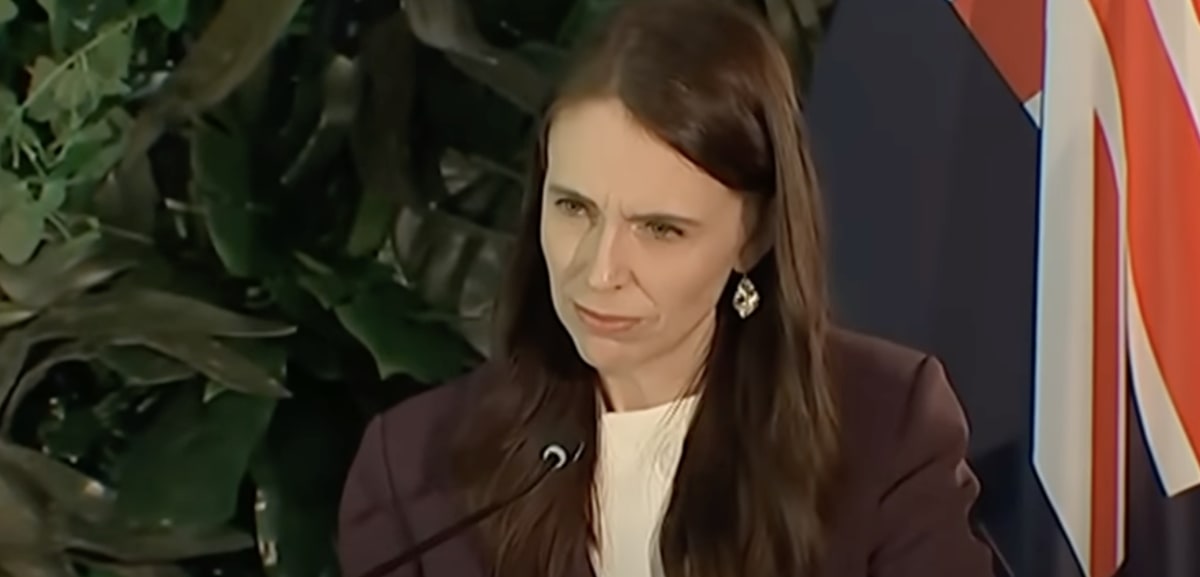
Jacinda Ardern may be increasingly unpopular with businesses at home, but international trade relations experts say we benefit from her status abroad
May 25, 2022: Jacinda Ardern appears on the US’s Late Show (audience 2 million+) with a chilly bin full of carbon neutral NZ beef, and for one minute 20 seconds she jokes with host Stephen Colbert about eskies, coolers and the splendidness of our nation’s meat.
As they say, you couldn't buy that sort of publicity.
At other times in the Colbert show, host and guest are more serious. They cover New Zealand’s Covid response, the opening of the borders, Colbert’s desire to take a second trip to our shores, and gun reforms in the wake of the Christchurch terror attacks.
(Ardern’s appearance on the Late Show coincidentally happens the day of a school shooting in Texas, which she says she relates to from the perspective of a mother, rather than a politician. The audience applauds.)
READ MORE: * Ardern's New York sprint selling 'Brand NZ' * Jacinda Ardern's outsized foreign policy legacy
Two days later, the Prime Minister gave the commencement address at Harvard, America's third-ranked university.

“Jacinda Ardern receives standing ovation for speech on gun control and democracy,” wrote The Guardian.
“Ardern’s forceful reminder: Democracies can die,” said Harvard’s official news website.
While things have been increasingly tense with the business community at home, on the international stage, Ardern has given New Zealand the sort of visibility no other prime minister has achieved, says trade expert Stephen Jacobi, head of the NZ International Business Forum.
“No one around the world wakes up wondering what New Zealand is doing, so the fact she has got people thinking about NZ is important,” he says. "She has realised the way we present ourselves and connect to international markets is critical to our commercial survival."
Jacobi attended the APEC summit in Bangkok in November and says Ardern was received with "superstar status" by Asia Pacific business leaders at the CEO summit.
"There was sustained applause during her speech, and outside everyone wanted photos, selfies."
“No one around the world wakes up wondering what New Zealand is doing, so the fact she has got people thinking about NZ is important.” – Stephen Jacobi, NZ International Business Forum
“She’s young and she’s a mother, but people see the way she has led the country during Covid and some of our darkest moments as testament to her skills and ability.”
Business leader Rachel Taulelei reckons that sort of profile for Brand New Zealand is a boon for exporters.
Taulelei founded sustainable seafood company Yellow Brick Road, was chief executive of Māori-owned food and beverage company Kono, chairs fisheries company Moana NZ, is a director of ANZCO Foods, and was the 2021 chair of the Asia–Pacific Economic Cooperation Business Advisory Council.

“Without any exaggeration, my experience working internationally during the time Jacinda Ardern was prime minister was resolutely positive. Everywhere she went she was incredibly highly regarded and the halo effect has been phenomenal.”
Having a well thought-of PM isn’t going to get your Kiwi product onto the shelves at an overseas supermarket chain, but it sure is a good start in negotiations, Taulelei says.
“It’s not a deal maker or breaker, but it’s a foot in the door. Whether you are jumping into a taxi in New York and the driver says you’ve got a great prime minister, or you are meeting with a powerful retail buyer in a big company and they have a positive view of Jacinda, the benefit is you aren’t coming from a standing start. It gives a point of connection between you and the person you are dealing with.”
High visibility
Bodo Lang is associate professor in the faculty of business and economics at the University of Auckland. He agrees the higher visibility of New Zealand under Ardern’s leadership might not be a game changer in business-to-business negotiations, but says it could be a factor in terms of consumer decisions.
It’s called the ‘country of origin effect’ Lang says – when someone makes a decision about a product because of where it comes from.
Russian companies, for example, will be suffering because of the negative consumer sentiment because of Putin’s invasion of Ukraine, no matter how good their products. By the same token New Zealand exporters could be benefitting from their PM’s strong communication skills.
“You might have identical products, but someone will choose the one that comes from a country perceived in a favourable light.
“Jacinda Ardern is seen as up-to-date and authentic, very humane in her reactions to disaster, sometimes soft and cuddly like your best auntie, but sharp tongued when she needs to be.”

A quick put-down when a journalist asked Ardern if she only met with Finnish leader Sanna Marin because of their similar age and other 'common stuff', saw positive coverage for the New Zealand Prime Minister overseas.
“Prime Minister shuts down reporter,” said a CBS news report, while a Guardian video got 185,000 views and a follow up story titled “The many times Jacinda Ardern has faced sexist questions from reporters.”
'Stunned' at resignation
Stephen Jacobi says he was stunned when the PM announced she was quitting. “Several diplomats asked me late last year if she would resign, and I said ‘Of course not’.
“But I understand the enormous pressure she has been under and the incredibly unjustified criticism she has received, particularly when it's often been of a personal nature."
He says the sentiment about Ardern at home is very different from that overseas. "But even business people in New Zealand who aren’t supportive of her prime ministership acknowledge and respect what she’s done internationally.”
It’s no secret a lot of business people are critical of what the present Government is doing, particularly around industrial relations, fair pay agreements, immigration and some of the Covid restrictions.

“Jacinda Ardern's leadership has been well-received internationally, and has given New Zealand brands a boost in visibility and prestige. However, the time is right for a change in leadership that will be beneficial for business growth and prosperity,” Ecostore Group chief executive Pablo Kraus told Newsroom.
It’s a sentiment echoed by Catherine Beard, director of advocacy at Business NZ.
“There are definitely pain points... not every policy has been seen as business-friendly.” – Catherine Beard, Business NZ
“There will definitely be mixed feelings. She’s done a good job putting New Zealand on the map in terms of having a high profile overseas and exporters benefit from that – and they need every advantage they can get.
“But there are definitely pain points, and while it’s difficult to separate her from the party, not every policy has been seen as business-friendly.”
Beard says free trade and other agreements with other countries are critical to New Zealand companies and they are largely be bipartisan and not affected by the party in power or the leader.
“Trade tends not to be used as a political football and the main parties see the need for free trade agreements, which are well supported by officials.”
The last few years have seen an FTA with the UK (although that hasn’t yet been ratified due to political strife in Britain), plus a somewhat controversial deal with the EU.
READ MORE: * UK-NZ trade deal battles on through British turmoil * The Detail: Getting the EU trade deal across the line
There has been expansion of the trans-Pacific CPTPP agreement, improved relationships with Australia and the US, and continuing good relations with China, despite tricky issues there.
Do we lose something important with Ardern’s resignation? Jacobi asks.
“She has been able to demonstrate qualities we have become tired of in New Zealand - empathy, kindness, leadership and integrity; qualities which have been subject to a lot of debate here but are still greatly appreciated internationally.
“She’s built up political and commercial capital for us around the world - and she is not going to continue to do that.”
“I’m saddened by it – I thought she still had a lot to give.”
But that’s the nature of the game. “We have to think about getting back on the horse.”







